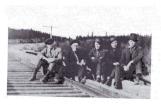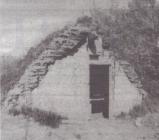1
Eugenia Makutra reminiscences about her family's immigration to Canada.2
I was born in the town of Kaminka Strumilova (now called Kamianka Buzka). I came to Canada with my mother, my grandmother (my father's mother) and my aunt (my father's sister). We arrived in 1909. I was four years of age. I don't recall anything of the old country because I was too young.My father went to Canada in 1907, to his uncle who lived in Yorkton. Saskatchewan. My father was a cabinetmaker and made cupboards and coffins. We lived in the suburbs of Kaminka Strumilova, on the bank of the River Bug. The panorama must have been beautiful.
My father knew how to play on two different instruments and he liked taking part in dramatic productions. We had very little land and it was hard to survive on the earnings of a cabinet maker. The family consisted of my parents, three children, my grandmother, my aunt and my uncle. That is why my father left for Canada hoping to improve his life. He worked very hard, working on the building of the railroad from the Atlantic to the Pacific Oceans. He was paid seventeen cents an hour. In the winter, he worked for farmers, making cupboards and other furniture.
After he had been in Canada for two years, he brought us over to join him. An epidemic of scarlet fever broke out before our departure and my sister and brother died of it. They somehow managed to cure me of the malady.
In 1910 we decided to go west of Yorkton where there were still homesteads to be had at ten dollars for 160 acres. We traveled by train. The nearest town was forty-five miles to the south. We couldn't go beyond the town because the railroad ended there. We bought two oxen and a wagon and drove north to the homestead. My parents told me that the trip had taken four days because the oxen had become lame and were unable to continue without resting.
My grandmother was a widow and so she also had the right to buy a homestead. This was all wild country with nothing on it, there were the empty sky, the woods, the native Indians and the wolves that howled all night. There was no place to spend the night except in the open, no stove to cook something to eat on. My mother and father slept under a tree, my grandmother and I under the wagon.
Thus we stayed under the open sky for a whole week. It took my father a week to build a two-roomed shack of logs and mud, with packed earth for a floor.
We got to work at once, clearing a plot of land of the trees, so that we could plough it and put in a garden. We didn't have a well because we didn't have the tools to dig one with. We drank water from a ditch, which we strained through a piece of cloth. In winter we melted snow for drinking water. During the first winter, we lived on bread, porridge and rabbit meat. My mother snared the rabbits. In summer we dug Seneca roots. My mother was very hard-working and earned from four to five hundred dollars selling these roots. We received a very good price for the roots before World War I.
At first, there was no school because there weren't enough children and no teacher. My father built the first school and it was named Volya (Freedom). I began going to school when I was nine. Before that, my grandmother taught me to read in Ukrainian. There were no qualified teachers because the parents wanted Ukrainian teachers, but these were not to be had because of low professional training. There were some who had had high school in the old country. In Canada, they attended special courses for teachers and then were able to teach. They taught a very limited number of subjects: geography, arithmetic and grammar. This last was very poorly taught because the teachers were unable to pronounce words correctly. English history gave us the most trouble because it dealt mainly with the British Empire, names of kings, lords and other aristocracy. All this was boring and incomprehensible to us. They didn't teach us the history of Canada at that time.
When I was fourteen years of age, my parents sent me to Saskatoon, to the Orthodox Ukrainian Bursa for further instruction. I spent two years there, until 1920. Although I was young, I didn't like the unfair treatment of students at the Bursa: the sons and daughters of rich farmers were treated better than those whose parents were poor.
It was at this time that my aunt married. Her husband was a member of the Ukrainian National Home. A split developed in this organization: some members remained, while others who were more progressive left. I went with my aunt and uncle. We didn't have a hall of our own and had to rent quarters in which to hold our meetings, choir and drama rehearsals. We had to work very hard. We began to build our own hall in 1919 and finished it in 1920.
EUGENIA MAKUTRA
TORONTO, ONTARIO
interview by Peter Krawchuk
3
A group of Ukrainian railway workers. M. Shymkiw is second from the left1918
Northern Ontario, Canada
 Credits:
Credits:Mikhailo Shymkiw
Nadia Sloboda
Kobzar Publishing
4
Sod roof on an early pioneer home1895
Edmonton, Alberta, Canada
 Credits:
Credits:Ukrainian Historical Pioneer Village
Kobzar Publishing
Vasyl Pylypiuk